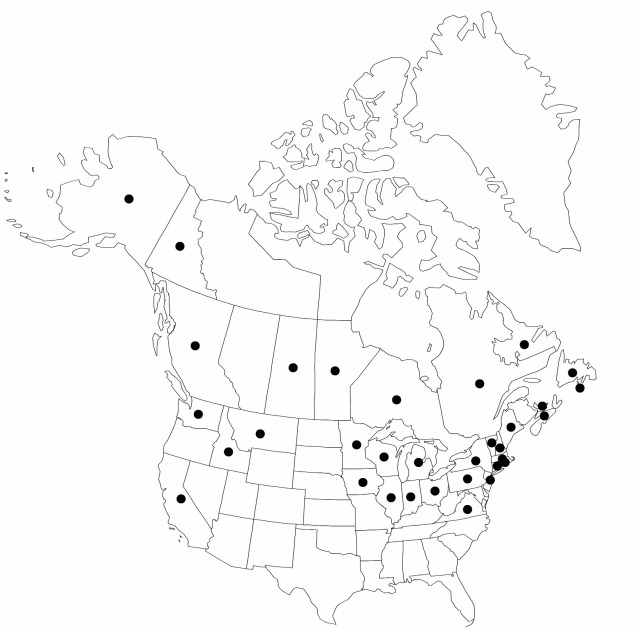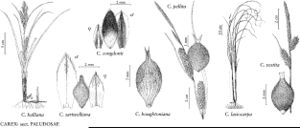Carex lasiocarpa
Hannover. Mag. 9: 132. 1784.
Plants colonial; rhizomes long-creeping. Culms lateral, trigonous, 40–120 cm, smooth or nearly so. Leaves: basal sheaths reddish purple, fibrillose, bladeless, apex of inner band glabrous; ligules 1–2.5 (–3.5) mm; blades gray-green, proximal portion of blade involute or gutter-shaped, becoming narrowly triangular-channeled, blades of vegetative shoots prolonged to curled, filiform tip, midveins of blades and proximal bracts low and rounded, forming inconspicuous keel, 0.7–2 (–2.2) mm, glabrous. Inflorescences 6–20 cm; peduncles of terminal spikes (0.8–) 2–9 cm; proximal 1–2 (–3) spikes pistillate, ascending; distal spikes erect; terminal 1–3 spikes staminate. Pistillate scales lanceolate to ovate, apex acute to acuminate-awned, glabrous or, often, ciliate or finely scabrous-margined apically. Perigynia ascending, veins esentially concealed, broadly ellipsoid, 3–4.3 × 1.5–2.2 mm, densely pubescent, obscuring cellular details and veination; beak 0.5–1.1 mm, firm, bidentulate, teeth straight, 0.2–0.7 mm. 2n = 56.
Phenology: Fruiting Jun–Aug.
Habitat: Sedge meadows, fens, bogs, lakeshores, stream banks, usually in very wet sites and sometimes forming floating mats
Elevation: 0–1300 m
Distribution

St. Pierre and Miquelon, B.C., Man., Nfld. and Labr., N.S., Ont., P.E.I., Que., Sask., Yukon, Alaska, Calif., Conn., Idaho, Ill., Ind., Iowa, Maine, Mass., Mich., Minn., Mont., N.H., N.J., N.Y., Ohio, Pa., R.I., Vt., Va., Wash., Wis., Eurasia
Discussion
Carex lasiocarpa is a dominant of boreal wetlands, often forming huge stands. Large stands of the species are quite striking at a distance because of their pale straw color derived from the dried and faded, curly, filiform leaf apices of the vegetative shoots. Sometimes extensive stands occur without fertile culms.
The reported hybrids between Carex lasiocarpa and C. stricta require confirmation (J. Cayouette and P. M. Catling 1992).
North American plants have, on average, slightly smaller perigynia and shorter beak teeth than European and Asian plants and have been distinguished as subsp. americana (Fernald) Hultén.
Selected References
None.
Lower Taxa
"lengthofbody" is not declared as a valid unit of measurement for this property."shortened" is not a number."prolonged" is not a number.
